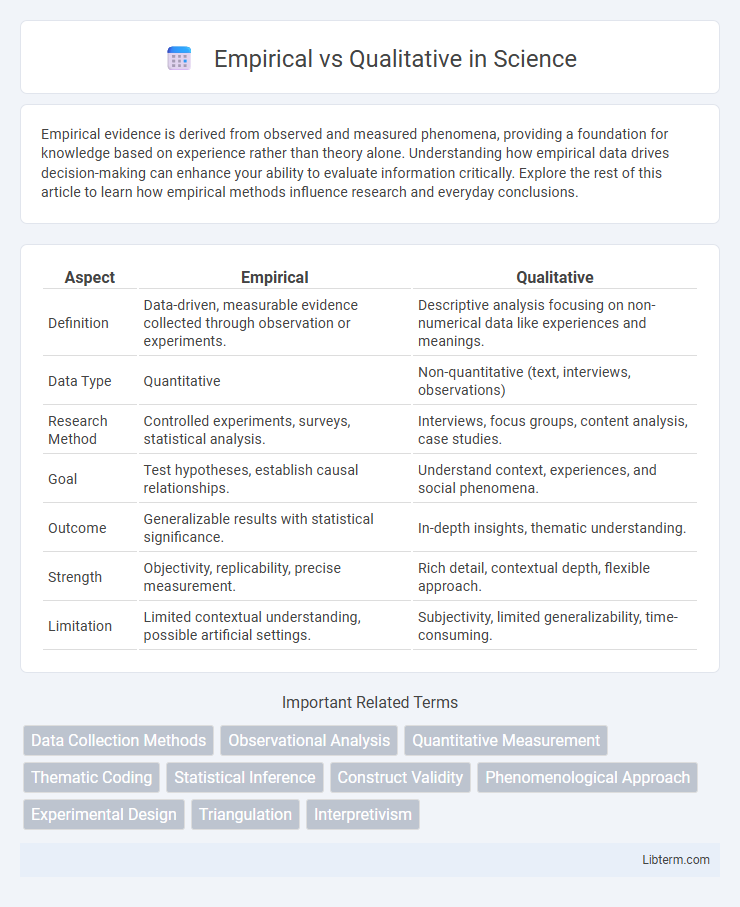Empirical evidence is derived from observed and measured phenomena, providing a foundation for knowledge based on experience rather than theory alone. Understanding how empirical data drives decision-making can enhance your ability to evaluate information critically. Explore the rest of this article to learn how empirical methods influence research and everyday conclusions.
Table of Comparison
| Aspect | Empirical | Qualitative |
|---|---|---|
| Definition | Data-driven, measurable evidence collected through observation or experiments. | Descriptive analysis focusing on non-numerical data like experiences and meanings. |
| Data Type | Quantitative | Non-quantitative (text, interviews, observations) |
| Research Method | Controlled experiments, surveys, statistical analysis. | Interviews, focus groups, content analysis, case studies. |
| Goal | Test hypotheses, establish causal relationships. | Understand context, experiences, and social phenomena. |
| Outcome | Generalizable results with statistical significance. | In-depth insights, thematic understanding. |
| Strength | Objectivity, replicability, precise measurement. | Rich detail, contextual depth, flexible approach. |
| Limitation | Limited contextual understanding, possible artificial settings. | Subjectivity, limited generalizability, time-consuming. |
Introduction to Empirical and Qualitative Approaches
Empirical approaches rely on observable, measurable evidence gathered through experiments, surveys, or quantitative data analysis, emphasizing objectivity and replicability. Qualitative approaches focus on understanding human experiences, behaviors, and social phenomena through interviews, case studies, and ethnography, prioritizing depth over numerical data. Both methodologies provide complementary insights used across disciplines such as social sciences, psychology, and market research.
Defining Empirical Research
Empirical research involves collecting and analyzing observable, measurable data through experiments, surveys, or observations to test hypotheses and establish factual evidence. This method emphasizes replicability and quantification, often using statistical tools to validate results. It contrasts with qualitative research, which explores underlying meanings and experiences through non-numerical data.
Understanding Qualitative Research
Qualitative research emphasizes exploring human experiences, behaviors, and social phenomena through methods like interviews, focus groups, and participant observations, offering in-depth understanding beyond numerical data. Unlike empirical research that often relies on quantitative measurements and statistical analysis, qualitative research seeks to capture context, meaning, and subjective perspectives. This approach provides rich, detailed insights that inform theory development and practical applications in fields such as psychology, sociology, and education.
Key Differences Between Empirical and Qualitative Methods
Empirical methods rely on measurable, quantitative data obtained through observation or experimentation, emphasizing objectivity and statistical analysis to validate hypotheses. Qualitative methods focus on understanding experiences, meanings, and concepts through non-numerical data such as interviews, case studies, and thematic analysis, prioritizing depth over breadth. Key differences include the nature of data collection, with empirical approaches using structured measurements and qualitative approaches employing open-ended, flexible techniques to explore context and complexity.
Types of Data Collected in Empirical vs Qualitative Studies
Empirical studies primarily collect quantitative data such as numerical measurements, experimental results, and statistical information to test hypotheses and establish patterns. Qualitative studies gather descriptive data, including interviews, focus groups, and observational notes, to explore experiences, meanings, and social contexts. Empirical data emphasize objectivity and replicability, while qualitative data provide rich, contextual insights into human behavior and phenomena.
Strengths and Limitations of Empirical Research
Empirical research excels in providing quantifiable and objective data, enabling researchers to establish patterns, test hypotheses, and produce replicable results that enhance generalizability. Its strengths include the ability to measure variables precisely and apply statistical analysis, which supports evidence-based decision-making across scientific disciplines. Limitations arise from potential reductionism, as empirical methods may overlook contextual nuances and subjective experiences that qualitative research captures, along with challenges like measurement errors and limited depth in understanding complex social phenomena.
Advantages and Challenges of Qualitative Research
Qualitative research offers in-depth insights into human behavior, emotions, and social contexts, making it ideal for exploring complex phenomena that are difficult to quantify. This approach excels in generating rich, detailed data through methods such as interviews, focus groups, and participant observation, providing nuanced understanding and flexibility. Challenges include potential researcher bias, difficulties in data analysis due to subjective interpretation, and limited generalizability of findings.
When to Use Empirical or Qualitative Methods
Employ empirical methods when seeking measurable, quantifiable data to test hypotheses or validate theories through statistical analysis. Qualitative methods are preferred for exploring complex phenomena, understanding participant experiences, and capturing contextual insights where numerical data is insufficient. Choose empirical approaches for hypothesis-driven research and qualitative methods to generate in-depth understanding and explore new concepts.
Integrating Empirical and Qualitative Approaches
Integrating empirical and qualitative approaches enhances research robustness by combining quantitative data-driven evidence with in-depth contextual understanding. Empirical methods provide measurable, statistically valid results, while qualitative techniques uncover nuanced insights through interviews, observations, and thematic analysis. This synergy facilitates a comprehensive perspective, allowing researchers to validate findings with empirical rigor while capturing the complexity of human experiences.
Conclusion: Choosing the Right Research Method
Selecting between empirical and qualitative research depends on the study's objectives and the nature of data required. Empirical research emphasizes measurable, quantitative data suitable for testing hypotheses and establishing causality, while qualitative research prioritizes in-depth understanding through observations and interviews that capture context and meaning. Researchers must evaluate whether the goal is to quantify variables or explore complex phenomena to determine the most appropriate method.
Empirical Infographic

 libterm.com
libterm.com